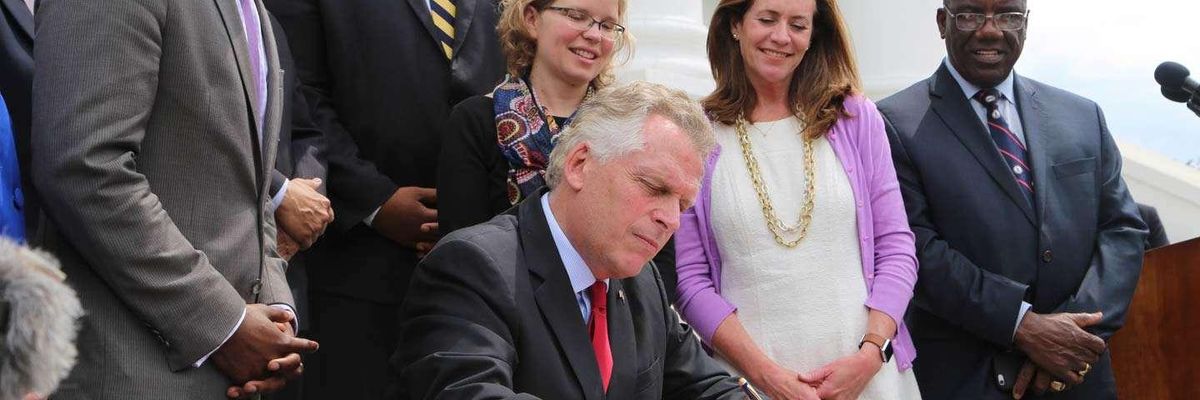Today, the Virginia Supreme Court will hear arguments in a suit challenging Gov. Terry McAuliffe's (D) April order that restored voting rights to 200,000 Virginians with past felony convictions. While the court proceedings will stick to legal arguments, the public debate has been needlessly rancorous and partisan.
After the governor issued the executive order, House Speaker William J. Howell (R) accused McAuliffe of using it as a "stepping stone" for a cabinet appointment that would be earned by getting Democratic voters signed up to sway the presidential election. Later, the governor responded that Republicans should "quit complaining" and go out and earn votes.
But looking at voting rights restoration through a political lens ignores several important points and obscures what's most important here.
First and foremost, hypothesizing about partisan implications misses the fact that Virginia's disenfranchisement policy has long been an outlier compared to the rest of the country. Virginia is one of only four states whose constitution imposes lifetime disenfranchisement for all people with past criminal convictions. And the consequences have been stark: hundreds of thousands, including one in five African-American Virginians, barred from voting for life. In reversing this antiquated and draconian policy, McAuliffe brought Virginia a step closer to the mainstream. With the order, Virginia joined 19 other states that also restore voting rights to all citizens completing sentences for past criminal convictions. Another 20 states and the District of Columbia restore rights even earlier or never revoke them in the first place.
Claims that McAuliffe's order will turn elections for Democrats are not only irrelevant, they are completely unsupported by the facts. Eleven of the 19 states that share Virginia's new approach to rights restoration have both Republican governors and Republican legislative majorities. This includes states like Texas, Oklahoma, South Carolina, and Kansas. And in states where governors have restored rights through large-scale executive actions and policy changes in the last decade -- Iowa, Florida, and Kentucky -- Republicans have had continued electoral success in state elections.
And Virginians supported the move. A mid-June poll found that 65 percent of Virginia voters -- including many Republicans and over 60 percent of independents -- supported the governor's order.
This context underscores the fact that reversing widespread disenfranchisement should be about basic fairness and human dignity, not scoring political points.
It is worth remembering that McAuliffe's order only restores rights to citizens who have fully completed all aspects of their sentences. Nearly half of those re-enfranchised under the order completed their sentences more than five years ago. They have long lived in their communities, working, raising families, and paying taxes -- all while barred from joining their neighbors and having a say at the ballot box. Consider the story of Shelia Carter, a Norfolk woman barred from voting for 28 years after a felony conviction, who told the press how voting made her feel "proud of herself" and "human."
Furthermore, research backs the idea that the re-entry process and public safety are served when citizens with past convictions are engaged in civic life and vote. One study found "consistent differences between voters and non-voters in rates of subsequent arrests, incarceration, and self-reported criminal behavior." And data from the Florida Parole Commission found the recidivism rate of Floridians with criminal convictions whose voting rights were restored was one-third the rate of those who remained unable to vote. There is also no evidence that points to disenfranchisement having a deterrent effect on future crime.
McAuliffe's order is the latest breakthrough in a national trend. Over the past two decades, more than 20 states have taken action to allow more people with past criminal convictions to vote, to vote sooner, or to access that right more easily. That forward progress made Virginia even more of an outlier until this past April. After the Virginia Supreme Court hears arguments in the lawsuit, we may hear in the press about Republicans taking on the Democratic governor, and both sides may offer some sharply worded quotes. But soundbites only obscure the reality on the ground: McAuliffe's order put Virginia squarely in the mainstream when it comes to restoring the right to vote -- and the state and thousands of new voters are better for it.



